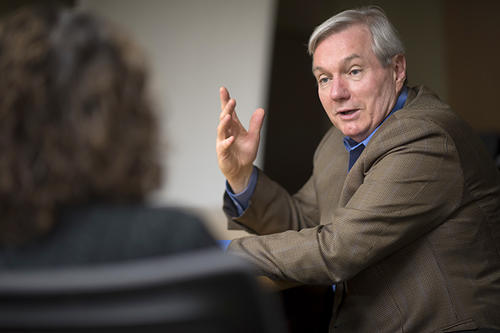
One of our most visible and vocal professors, Michael Osterholm is an international “go-to guy” for research and advice on issues like how to control infectious diseases around the world and bioterrorism. In June he and two other professors were named Regents Professors, the highest faculty rank. Osterholm has defined the key factors in preparing for pandemics, including influenza. He is a world leader in developing a rapid and effective global response to the Ebola epidemic in West Africa and has lent critical leadership to governments in the Middle East seeking to control MERS. His New York Times best-selling book Living Terrors: What America Needs to Survive the Coming Bioterrorist Catastrophe gave a blueprint for the U.S. government’s response to the post-9/11 anthrax attacks. And he ranks among the nation’s foremost experts on issues of food safety and the investigation and response to foodborne illnesses. As director of the Center for Infectious Disease Research and Policy (CIDRAP), Osterholm leads an organization that generates and disseminates the best and most current information about how to protect public health, especially in the face of emerging diseases and other threats. He sums up CIDRAP’s role with typically pithy prose: There were two silos: the policy world and the science world. This center was meant to try to bridge that gap … to improve the public’s health. We ascribe to the Wayne Gretzky model of playing hockey: Good hockey players skate to where the puck is, but great hockey players skate to where the puck is going to be. That’s what public health should be all about—preventing something from happening. This kind of straight talk has made Osterholm a favorite of reporters everywhere who want a clear and honest assessment of a public health situation. Also an exceptional teacher and adviser, Osterholm has won the University’s Award for Outstanding Contributions to Postbaccalaureate, Graduate, and Professional Education and the 2010 Outstanding Faculty Award from the University of Minnesota Council of Graduate Students. In 2004 he was elected to the Academy of Medicine (formerly the Institute of Medicine) of the National Academy of Sciences. Meet all three new Regents Professors.
- Categories:



